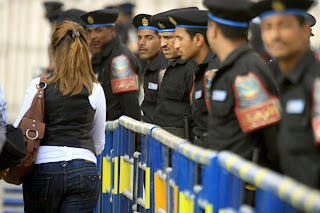
This male ally post is cross-posted from Rebel with a Cause Bog.
News came out yesterday about a draft law that has been proposed by the government issuing harsher punishments for those who commit sexual harassment and rape crimes, up to the point of death sentence.
The new law tackles various points: adding telephone and the internet to different media through which harassment can occur; and giving more conditions when rape convicts get harsher punishments such as reconsidering victim’s age and cases where the victim has been raped by more than one convicts.
This is a reminder of a similar law which just passed a few days ago for combating thuggery. The news of that law was alarming to me as well as many other human rights activists. The move towards stricter law for thuggery was met with a lot of criticism. Just before this particular law was passed, the military forces cracked down on Tahrir protesters, many were detained and tortured. These protesters were claimed to be thugs which puts us at a dilemma of how to determine who’s a thug and who’s a protester, especially because we are at a time where military courts (where people do not enjoy their full rights of fair trial) have been handling these cases.
Back to sexual harassment, it is quite obvious there’s a problem with the way we’re dealing with this issue. The phenomenon which began surfacing rather recently in Egypt is rampant. But is issuing stricter punishments the solution for this multifaceted problem? Here’s why I don’t think so:
I find the process highly questionable. The ministerial council pushes for more punishments for sexual harassment and the supreme military council is happy to enforce these, because this is the language the military best understands. In normal circumstances the ministerial council can propose draft laws and submit them to the parliament to discuss them further. Either way there need to be more public debate about it.
Drafting laws without counseling civil society bodies or human rights experts is pretty concerning. These laws have to be compatible with human rights law, and there need to be clear definition and good consensus on what sexual assault entails.
I am more concerned with how to enforce this law, rather than the punishments themselves. There are big question marks on how to get these cases reported? We have a culture of silence about these crimes. It’s hard for people to report them because a huge stigma can be placed upon them. Most women who face sexual harassment or even rape never report it to the police or even to their families because their lives can be devastated.
We have this culture of intimidating criminals by increasing punishments. I don’t really believe it works. To be able to overcome a societal problem, we need to handle its underlying causes. All those handling those crimes need to be sensitized about it and fully aware of its implications. By engaging different people in the process of ending the phenomenon of sexual harassment, real achievement can happen on that front.
– Ahmed Awadalla, Cairo, Egypt
This post is part of the weekly blog series by male allies. We need men involved in the work to end the social acceptability of street harassment and to stop the practice, period. If you’d like to contribute to this weekly series, please contact me.
